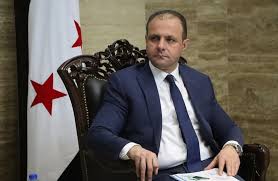Russian media have published new details about the life of Dr. Maher al-Sharaa, brother of Syrian President Ahmad al-Sharaa, shedding light on his long stay in Russia. The revelations coincided with the announcement of his appointment as Secretary General of the Presidency of the Republic—a move that has sparked wide-ranging debate in Syria’s emerging political landscape.
The Doctor from Voronezh
According to Russian reports, Maher al-Sharaa, born in 1973, spent many years living in the central Russian city of Voronezh. He graduated from the Voronezh State Medical Academy in 2000 with a degree in general medicine and later specialized in obstetrics and gynecology in 2004. Al-Sharaa holds a doctorate in medical sciences and completed numerous professional training courses in Russia.
Between 2004 and 2013, he worked in hospitals across Syria, before returning to Russia where he held medical positions at several women’s clinics—most notably in Voronezh and at Abha Maternity and Children’s Hospital between 2014 and 2018. According to the Russian platform Pro Doctorov, he received largely positive reviews from patients during his medical career.
Privately, Maher al-Sharaa is married to Tatiana Zakirova, a Russian national who also holds Syrian citizenship. The couple has three children. Russian records indicate that he left the country for Turkey in July 2022 and has not returned since.
A Surprise Appointment and Public Scrutiny
Al-Sharaa’s appointment as Secretary General of the Presidency—succeeding Abdulrahman Salameh, who has been assigned new duties—was widely interpreted as a political reward. This perception is reinforced by his prior role as acting Minister of Health in the transitional government and his involvement in advisory work at hospitals in northern Syria.
The post he now holds is far from ceremonial. The General Secretariat of the Presidency plays a strategic role, coordinating directly with the president, drafting decrees, overseeing the implementation of executive decisions, and facilitating communication among state institutions. As such, it is seen as a key seat of sovereign power—raising questions about the symbolism and implications of placing the president’s brother in such a position.
Concerns Over Nepotism
Critics were quick to voice concerns about what they see as the re-emergence of political nepotism. Human rights advocates and political activists warned that this appointment could signal a return to “family-state” governance. Journalist Wael al-Tamimi remarked, “Syrians revolted against dynastic rule. Appointing a relative of the president to such a sensitive post is a step backward in the project of building a state based on citizenship.”
Legal expert Osama Abu Zeid added that assigning top positions to relatives undermines the independence of political decision-making and runs counter to the principles the Syrian revolution sought to uphold.
A Defense: Trust in Times of Transition
On the other side of the debate, writer Suhair al-Omari defended the appointment, arguing that the role of Secretary General demands “absolute trust, which may only be found in the closest of allies or relatives.” She insisted that the appointment does not carry sovereign privileges, but rather reflects a need to safeguard the integrity of governance during a particularly sensitive period.
Between Trust and the Test of Institutions
For many Syrians, Maher al-Sharaa’s appointment remains under close public scrutiny, especially in a post-Assad Syria where citizens are seeking transparent governance and institutions free from political patronage. Balancing the need for trust with the demands of a state striving for institutional legitimacy is a delicate task. This appointment may become a litmus test for Syria’s new leadership as it attempts to demonstrate its commitment to democracy, meritocracy, and transparency.
This article was translated and edited by The Syrian Observer. The Syrian Observer has not verified the content of this story. Responsibility for the information and views set out in this article lies entirely with the author.


